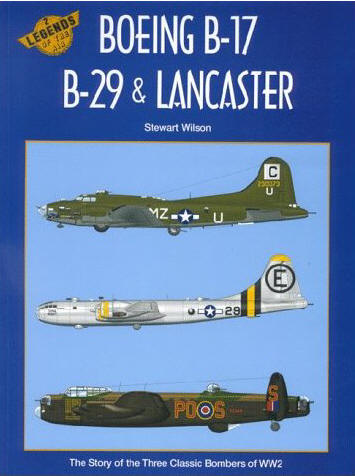
 |
|
|
 |
187567117XHere to Buy the Boeing B-17, B-29 & Lancaster Bombers Book
Paperback Book
B-29
Books * B-29 Superfortress Movies
* B-29
Models
B-17
Books * B-17 Flying Fortress
Movies * B-17
Models
|
Pure Luck Hardbound Book The Authorized Biography of Sir Thomas Sopwith Bramson. This book traces the remarkable story of Sir Thomas Sopwith, a contemporary of the Wright Brothers whose 101-year life spanned aviation history. You'll read of his Camel and Pup that revolutionized aerial combat in WWI; of his Hurricane and Lancaster, which were amongst the most successful designs of WWII; and of the remarkable Harrier "jump jet," which emerged from an industrial empire that employed up to 127,000 people. 288 pages, 98 B&W photographs, 6"x 9", hardcover. |
| Book Description
The second of the Legends of the Air series which narrates the operational and development histories of the most important strategic bombers of WW2. Features of Legends of the Air Volume 2 include approximately 70,000 words detailing the three famous bombers, 48 specially commissioned color sideview drawings, specification and production tables, maps of areas of operations, and hundreds of photographs. Boeing made reality the operational concept of strategic bombing with the B-17 Flying Fortress. In combat, the B-17 had to fight a difficult battle to prove the concept of daylight bombing. In operation through the darkest hours over both Europe and the Pacific, the 17 became the hallmark bomber of WW2 and paved the way for not only for its peers but its successors. England meanwhile had in the
British Lancaster
possibly the finest strategic bomber of WW2 on a payload/range basis and
chose a different operational path than the Americans inoptimizing their aircraft for night operations against Germany. The development
and operational record of this fine aircraft is fully detailed and
backed up by a plethora of never before seen photos and specially commissioned
artwork.
The ultimate heavy bomber of the era was Boeing's B-29 Super fortress. Pressurized, able to fly above the flak, computerized, and armed to the teeth with automatic defensive .50 guns, the 29 flew missions over distances not even imaginable a decade earlier and ushered in a new era of large aircraft design that would give birth to both the long range airliners and bombers of the postwar era. Excerpted from Boeing B-17 B-29 & Lancaster (Legends of the Air, 2) by Stewart Wilson. Copyright © 1996. Reprinted by permission. All rights reserved Seattle Tragedy Unfortunately, things got much worse before they improved. On 18 February 1943, Eddie Allen and his ten man crew departed Boeing Field on a test flight in the second XB-29. Eight minutes after takeoff the No 1 engine caught fire. It was shut down and the propeller feathered. Allen decided to return to land, thinking the fire was out. Unfortunately, it was not and undetected by the crew was in fact eating through the front spar of the port wing. It wasn't until the aircraft was on base leg that the fire was noticed, Allen attempting to get the aircraft down as quickly as possible as it was obvious by the intensity of the fire that it couldn't survive for long.
Allen lost control at a height of about 250 feet (76m), the XB-29 crashing into a meat packing plant about three miles (5km) from the runway, killing all on board and 19 on the ground. The investigation into the accident laid most of the blame at the door of the engine manufacturer, Wright, although the USAAF was itself criticized for putting Wright into a position where quick results were being demanded of it. Engine problems continued to dog the B-29 well into 1944 before they were finally solved. It was found that excessive cylinder head temperatures resulted from poorly lubricated valves and that a faulty fuel induction system design was responsible for the fires. The latter wasn't positively proven until 1944 when the first XB-29 suffered a fire, but quick extinguishing of it meant the engine could be examined after landing. Previously, the evidence had been destroyed by the fire itself. |
Take
a trip to the North Pole with our Team
Y-I-BET
Look at these exhibits and tell me what these men really fought for.
About the Webmaster, Why God Send Me to the North Pole
On the Youth of America
Take a tour of an operational WW2 fighter squadron stationed
on the Western Pacific Island of Ie Shima. This is a historical event
showing the complete fighter operation from the Mess Hall to the P-47 in
flight. You can also see the Japanese Surrender Delegation visit
the Island.
the 34th fighter Squadron
USS Kitty Hawk
Click here to see how I have to live and what it looks like to be
a disabled Vet.
| . |